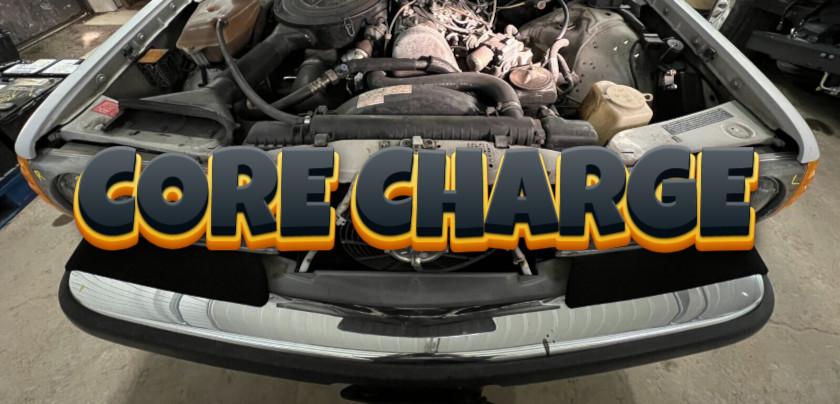
Core charges are common in the automotive industry, particularly in the realm of auto parts remanufacturing. A core charge is a deposit that a manufacturer or retailer may apply when you purchase certain automotive parts like alternators, starters, and brake calipers. It's essentially a recycling incentive. Here's an in-depth look at core charges, what they entail, and which car parts typically come with core charges.
Core Charge Basics
A core charge is a refundable deposit on a rebuilt or remanufactured part that serves as an incentive for the return of the old, used part (the core). The purpose of this practice is to encourage recycling, as these used parts can often be refurbished, reducing waste and saving resources. It's essential to understand how core charges work and why they're in place:
1. Purchase with Core Charge: When you buy a part with a core charge, you pay a higher price upfront, which includes the core charge.
2. Return of the Old Part: You're expected to return the old, original part (the core) to the retailer or manufacturer. This core must be of the same type and in rebuildable condition.
3. Core Inspection: Once the old part is returned, it's inspected. As long as it's rebuildable, you receive a refund of the core charge.
4. Core Charge Amount: The amount of the core charge varies depending on the part and the manufacturer but can range from a few dollars to over a hundred dollars.
Car Parts with Core Charges
Core charges are typically applied to parts that are commonly rebuilt or remanufactured. Here are some car parts that often come with core charges:
1. Alternators: These provide electrical power to a vehicle's systems and charge the battery. Core charges on alternators are common.
2. Starters: Starters are essential for igniting the engine. They can have core charges too.
3. Brake Calipers: These components are integral to the braking system. Core charges are typical due to the refurbishing process.
4. Power Steering Pumps: Power steering pumps assist with steering and often come with core charges.
5. Diesel Fuel Injectors: Used in diesel engines, fuel injectors are critical components that may come with core charges.
6. Turbochargers: Turbochargers increase an engine's efficiency. They're often subject to core charges due to their refurbishment potential.
7. Water Pumps: Responsible for cooling the engine, water pumps sometimes have core charges.
8. Steering Gearboxes: These parts are essential for steering mechanisms and can be subject to core charges.
9. Master Cylinders: Found in the brake system, these components are often remanufactured, leading to core charges.
10. Transmission Torque Converters: Torque converters, which are integral to the transmission, may have core charges.
Why Core Charges Are Applied
Several reasons underpin the use of core charges:
1. Encourage Recycling: Core charges promote recycling and the refurbishing of old parts, reducing environmental impact.
2. Cost Reduction: Remanufacturing a used part is often more cost-effective than manufacturing a new one from scratch.
3. Resource Conservation: Reusing existing parts helps conserve natural resources, energy, and materials.
4. Availability of Quality Parts: Core charges help ensure a supply of high-quality, refurbished parts in the market.
5. Economic Incentive: They create an economic incentive for customers to return old parts, keeping them out of landfills.
How Core Charge Refunds Work
To receive a refund for a core charge, you must adhere to specific steps:
1. Retain the Old Part: After purchasing a part with a core charge, keep the old, original part to return.
2. Prepare for Return: Drain any fluids (e.g., oil, coolant) from the core, remove any accessories or components not part of the core, and package it for return.
3. Return to the Retailer: Take the core and your purchase receipt back to the retailer, whether in-store or through a return process specified by online retailers.
4. Core Inspection: The retailer or manufacturer will inspect the core. As long as it's in a rebuildable condition and matches the core part type, you'll receive a refund.
5. Refund Process: The refund process can take time, often a few days to a few weeks, depending on the retailer.
Impact on DIYers and Auto Repair Shops
For DIYers and auto repair shops, core charges can have both positive and negative implications:
Pros:
1. Cost Savings: Core charges make remanufactured parts more affordable, benefiting those who don't mind returning old parts.
2. Eco-Friendly: Encourages recycling and environmentally conscious practices within the auto industry.
Cons:
1. Upfront Costs: Core charges can increase the upfront cost of a part, which may be a concern for some.
2. Core Return Hassles: Returning old parts can be inconvenient, especially if the retailer is far away.
3. Refund Delays: Waiting for the core charge refund can tie up your money until the core is processed.
